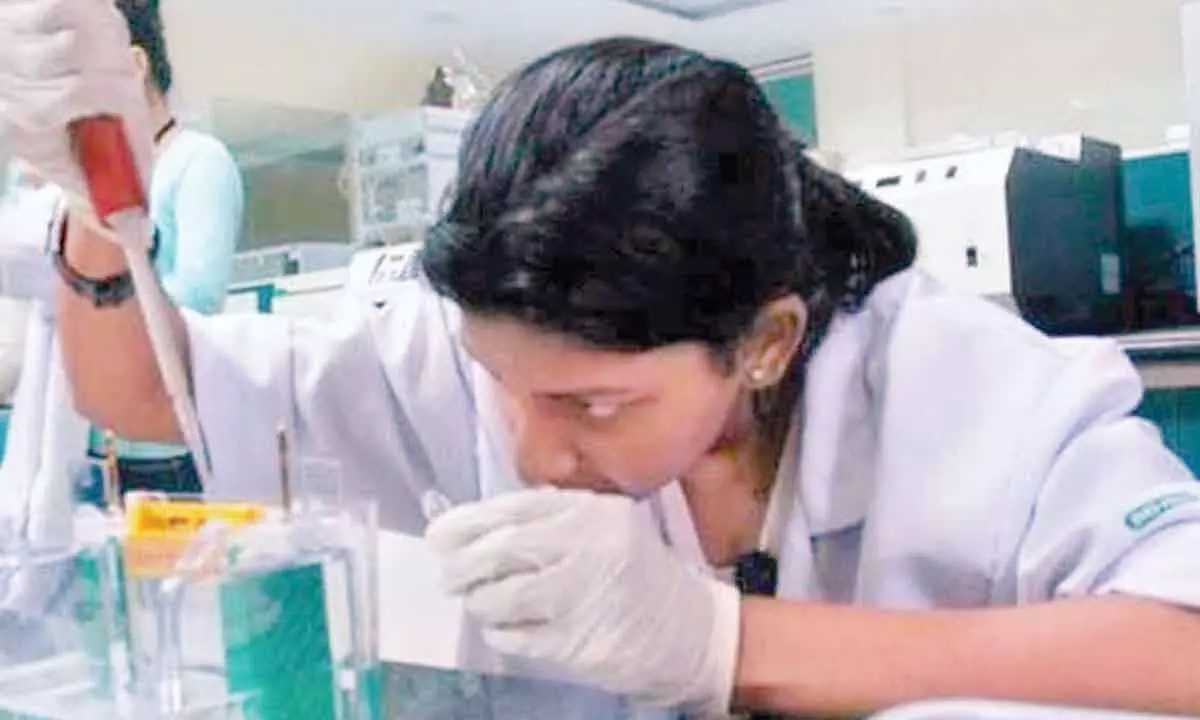Live
- Controversy Over Congress President’s Remarks on Maha Kumbh Mela
- CM Urges H.D. Deve Gowda to Stand Above Politics for Karnataka’s Water Rights
- Unseeded Kyrian Jacquet upsets second seed Billy Harris to win Delhi Open 2025 singles title
- India headed to become $30-35 trillion economy in next two decades: Piyush Goyal
- Medical Students to Adopt Rural Families as NMC Pushes for Community-Based Learning
- Central Railway runs special trains, improves crowd management for Mahakumbh devotees
- Yamuna's cleaning drive in Delhi: PM Modi's pre-election promise now in action
- IPL 2025: LSG is a strong contender for the title, says Zaheer Khan after schedule’s release
- Maha Open: Ramanathan progresses to final qualifying round
- PM Modi fixes Rs 9 lakh crore target for textile exports by 2030
Just In
India 3rd in growth of women researchers


New Delhi: India ranks third in the growth rate of women researchers, according to a report from scientific information disseminator Elsevier, which...
New Delhi: India ranks third in the growth rate of women researchers, according to a report from scientific information disseminator Elsevier, which also underlined that gender equality in the domain remains "unacceptably far away" globally.
At two per cent, India's yearly growth rate of women's share of active researchers over the last decade was the third highest, behind Egypt and The Netherlands only, the report titled 'Progress Towards Gender Equality in Research and Innovation - 2024 Review' said.
Analysing inclusion and diversity across disciplines and geographies over 20 years, the report found that in India, women now make up 33 per cent of active researchers, compared to 22 per cent in Japan and 30 per cent in Egypt. India is now the world's third largest research producing country, it said.
"India's rapid growth in women researchers highlights the ongoing gender equity efforts and are truly encouraging," said Prof Sandeep Sancheti, Vice President of Research Relations & Academic Affairs at Elsevier India. "While we have made significant headway in creating a more inclusive academic environment, challenges still remain," said Sancheti.
Gender parity (40-60 per cent representation is defined as parity zone in the study) among researchers in health sciences was achieved in 2022, with women representing 41 per cent of all active researchers in India, according to the report.
In life sciences, gender parity was achieved in 2021. As of 2022, women researchers in life sciences represented 43 per cent of the active ones, it said.
The authors found that as of 2022, globally women researchers represented 41 per cent of those active, with a strong representation in health sciences.
They added that while women have made gains in the last two decades, the progress has not been uniform across fields. For example, in physical sciences women made up only 33 per cent of the active researchers. At the current rate, the authors of the report noted that globally, gender equality in research remains “unacceptably far away”. They projected that although numbers of women researchers in mathematics, engineering and computer science are increasing, gender parity overall is not expected until 2052. Women also filed “vastly fewer” patent applications than men, the authors said.
“As of 2022, three-quarters of patent applications came are filed either by men alone or by teams consisting only of men. Nearly, all patent filing teams (97 per cent) have at least one man in them. In contrast, just three per cent of patent applications as of 2022 are filed by teams consisting only of women,” the authors wrote.
Regionally too, women’s participation in the research workforce was found to differ with those in countries including Portugal and Brazil making up about half of the active researchers, and those in the US and the UK making up 40 per cent of the active researchers. The report said that among active researchers working on the United Nations’ Sustainable Development Goals, women formed the majority. There were also slightly more women than men engaging in multidisciplinary research, considered important for solving complex challenges at the global level, it said.
The authors recommended accelerating efforts towards achieving gender equality in research. They also called for arresting the fall in women’s participation with rising seniority, by prioritising the retaining of early-stage career researchers into mid- and advanced-stages.

© 2025 Hyderabad Media House Limited/The Hans India. All rights reserved. Powered by hocalwire.com






